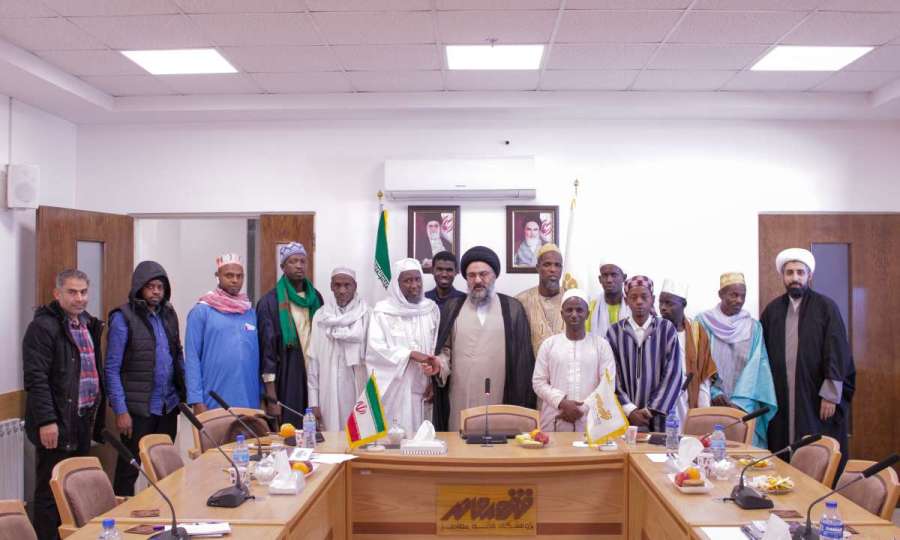A group of Sunni clerics and religious missionaries of Guinea-Bissau attended the Research Institute of Contemporary Jurisprudence and met and talked with the Institute’s activities.
In this meeting, which was held on Monday, 5th of Feb, 2024, Ayatullah Mujtaba Nurmufidi, while welcoming the guests on the ten days of Fajr, said: Iran’s Islamic revolution led by Imam Khumayni, may his soul rest in peace, opened a new window for the relationship between Iran and Africa, and he looked specifically at the relationship between Iran and Africa. They supported the people of Africa and even now the Supreme Leader is paying special attention to the people of this region.
Emphasizing the existence of various commonalities between the Tijaniyyah Tariqa and the Shi’ah denomination, he pointed to the issue of the relationship between mystic jurisprudence and said: Imam Khumayni, as a great mystic, has served mysticism a lot. According to Imam Khumayni, mysticism and Sufism have a positive and negative sides. They interpret positive Sufism and positive Sufi as “pure Sufi”.
The professor of foreign courses at Qum Seminary added: According to Imam Khumayni, a Safi Sufi is someone who has brought mysticism from the level of intellect and heart to the level of action and adheres to Shari’ah, and a Sufi without Safa is someone who does not adhere to the appearance of Shari’ah.
Ayatullah Nurmufidi added: In general, according to Imam Khumayni, who is a supreme mystic, both human and religion have two fields. One outside and one inside. The appearance in man is the origin of the movement towards the interior, and actions and rituals cause the heart, soul, and interior of a person to change.
He said: The mutual influence of the body on the soul and the appearance of the inner being is something that is confirmed by both human experience and science. Worships and rituals that have been presented to man in the form of Shari’ah law are the only way of human spiritual interaction. Also, heart, mental and spiritual states are the cause of devotional rituals. The connection of these two forms the basis of true mysticism.
The head of the Research Institute of Contemporary Jurisprudence added: Imam Khumayni, who is the leader of the mystics of his time, emphasizes one thing in the mystical books, and that is the “Secrets of Worship”. According to him, if someone is a worshiper but does not pay attention to the secrets of worship, he has not benefited from the truth. According to him, if someone only pays attention to the secrets of worship and does not pay attention to rituals, he will be caught in the devil’s trap.
He pointed out: Imam Khumayni’s attention to mysticism shows the deep connection between jurisprudence and mysticism from the perspective of Shiism. If the historical disputes of scholars of jurisprudence, mysticism and Sufism are understood and known, the importance of Imam Khumayni’s, may his soul rest in peace work will be known more. This conflict exists and can be seen among both Shi’ah mystics and jurists and Sunni mystics and jurists. Some jurists accused the people of knowledge and mysticism of disbelief and immorality, and some of the people of mysticism accused the jurists of stratification and appearance.
Ayatullah Normufidi added: These accusations and historical disputes have many factors, the main reason of which is the lack of mutual understanding between jurists and mystics of each other’s views. This important issue, along with the lack of leadership and intolerance, caused the enemies to fuel these conflicts. In such an environment, Imam Khumayni, may his soul rest in peace, did several important things that are considered a great service to Islam, Islamic knowledge and scientists. First, Imam Khumayni worked so hard to study jurisprudence, mysticism, philosophy and other sciences that he became the leader of the scholars of his time. The jurisprudential and mystical books of Imam Khumayni are among the most profound books of this knowledge.
He added: In this book, they tried to present the controversial concepts and understand them and pay more attention to the depth of these contents. Imam Khumayni, along with some jurists and mystics, warns to avoid takfir and tafsiq and if you see something that is unfamiliar to you.
Ayatullah Nurmufidi addressed some points and advice to the religious missionaries and said: We must know the times and the needs of the people of our time and try to present religious and divine knowledge in an attractive format and good literature according to the needs of the audience. Let’s recognize the difference in tastes and try to reach a common understanding through dialogue. Try to raise your scientific level and knowledge. But the most important thing is to be a teacher of the people through action.
At the beginning of this meeting, he mentioned his presence in some North and South African countries and said: African people have a pure nature, regardless of religious differences, and this nature is a very suitable ground for you missionaries to convey the message of Islam to them.

